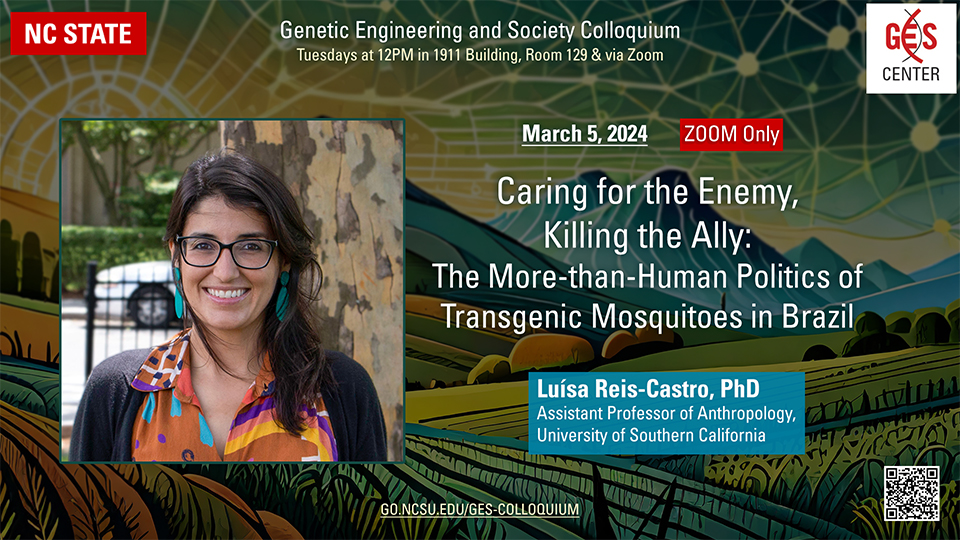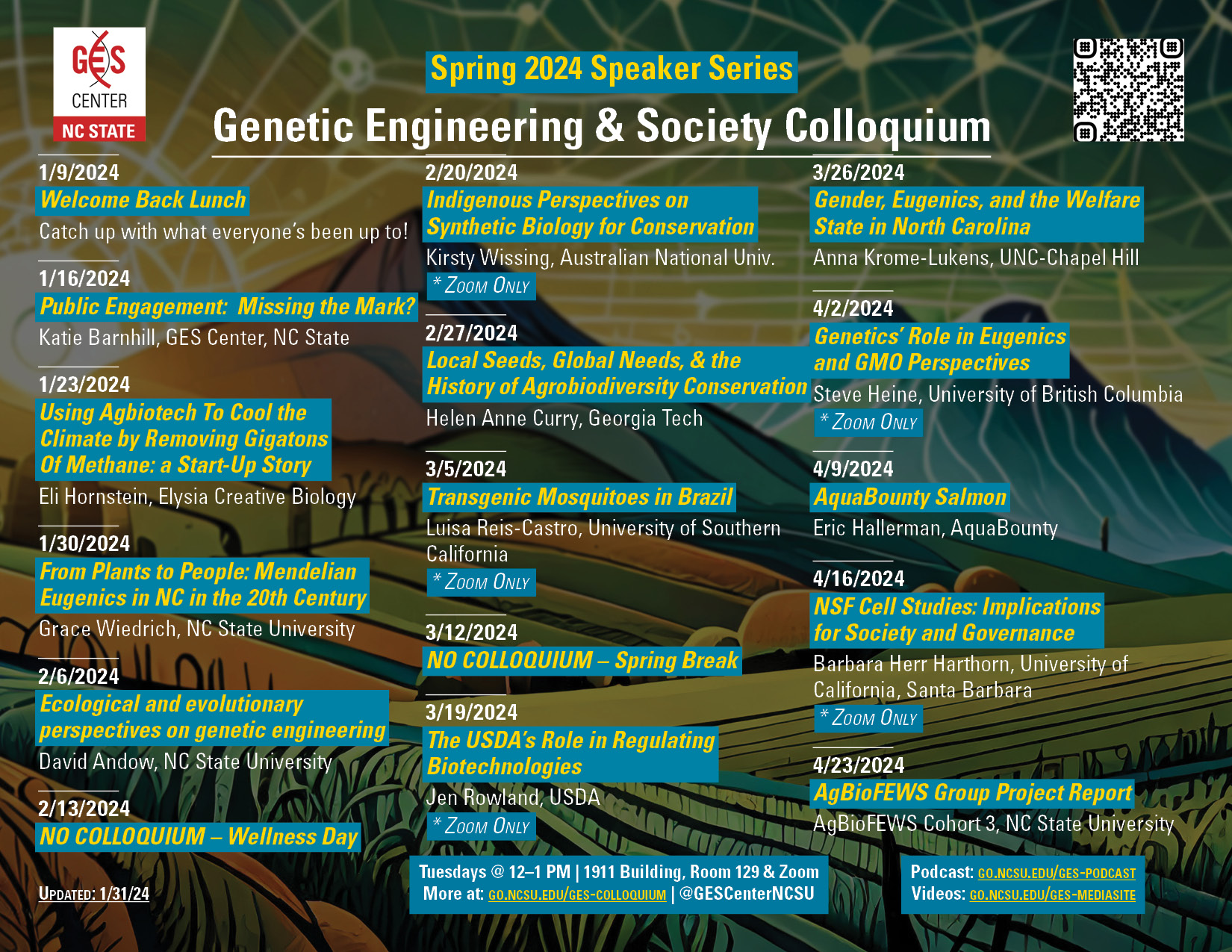
- This event has passed.
Luisa Reis-Castro – The More-than-Human Politics of Transgenic Mosquitoes in Brazil [Zoom Only] | GES Colloquium

Colloquium Home | Zoom Registration | GES Video Library (current) | Video Archives | Podcast | @GESCenterNCSU | Newsletter
Caring for the Enemy, Killing the Ally: The More-than-Human Politics of Transgenic Mosquitoes in Brazil 
Luisa Reis-Castro, PhD, Assistant Professor of Anthropology at the University of Southern California
Profile | X | Bluesky
This talk, based on ethnographic research with scientists and technicians working with transgenic mosquitoes in Brazil, examines the class, gender, and regional issues present in the efforts to transform the mosquito from a “problem” into a “solution.”
Download seminar poster
Abstract
The Aedes aegypti mosquito, known as the vector for Zika, dengue, chikungunya, and yellow fever viruses, has historically been targeted by public health campaigns as an enemy to be eliminated. However, new strategies, such as the transgenic approach, biologically modify the A. aegypti so that they can be deployed to control their own population—here, mosquito breeding and mating are operationalized as an insecticide. In this case, the insect must be simultaneously a friend and an enemy, cared for and killed, and it must establish encounters and nonencounters.
Drawing on ethnographic fieldwork at a “biofactory” in the northeast of Brazil dedicated to mass-producing these transgenic mosquitoes, this article investigates the new forms of labor and value produced through these contrasting human-mosquito relations. The author also examines how the project is implemented within the broader geopolitics of experimentation and more-than-human gendered conceptions. Analyzing the multispecies relationships engendered under the premise that it is possible to produce nonencounters, she identifies the historical conditions and promissory claims of transforming the A. aegypti ’s reproductive capacity into labor for killing. Such recasting yields what the author calls the “nonencounter value” within the scientific remaking of mosquitoes, their becoming and being.
Related links:
- Luísa Reis-Castro; Becoming Without: Making Transgenic Mosquitoes and Disease Control in Brazil. Environmental Humanities 1 November 2021; 13 (2): 323–347. https://doi.org/10.1215/22011919-9320178. PDF
- Video: Haedes & Aegypta e a abordagem da Oxitec (Anthropomophized mosquitoes depicting the male as a hero and the female as the villain)
Speaker Bio
Dr. Luísa Reis-Castro is an Assistant Professor in Anthropology. Reis-Castro’s research broadly explores the social, cultural, political, and historical dimensions of scientific knowledge about human-animal relations, particularly when harm to humans is involved, as seen with mosquitoes transmitting pathogens. Her first project investigates techno-scientific projects in Brazil that, rather than fight against the Aedes aegypti mosquito, work to harness the insect to tackle the viruses it is known to transmit (Zika, dengue, chikungunya, and yellow fever). By using ethnographic and historical research methods, she explores what these projects can tell us about the geopolitics of knowledge production in an interdependent, unequal world increasingly affected by human activity. She received her PhD from the Program in History, Anthropology, and Science, Technology, and Society at the Massachusetts Institute of Technology.
GES Colloquium is jointly taught by Drs. Jen Baltzegar and Dawn Rodriguez-Ward, who you may contact with any class-specific questions. Colloquium will be held in person in the 1911 Building, room 129, and live-streamed via Zoom.
Please subscribe to the GES newsletter and LinkedIn for updates.
WordPress database error: [Unknown column 'wp_tec_occurrences.start_date' in 'SELECT']SELECT SQL_CALC_FOUND_ROWS wp_posts.*, CAST( wp_tec_occurrences.start_date AS DATETIME ) AS event_date
FROM wp_posts LEFT JOIN wp_term_relationships ON (wp_posts.ID = wp_term_relationships.object_id) LEFT JOIN wp_postmeta ON ( wp_posts.ID = wp_postmeta.post_id AND wp_postmeta.meta_key = '_EventHideFromUpcoming' ) LEFT JOIN wp_postmeta AS mt1 ON ( wp_posts.ID = mt1.post_id )
WHERE 1=1 AND wp_posts.ID NOT IN (19502) AND (
wp_term_relationships.term_taxonomy_id IN (149,521,802)
OR
wp_term_relationships.term_taxonomy_id IN (45,47)
) AND (
wp_postmeta.post_id IS NULL
AND
( mt1.meta_key = '_EventStartDate' AND CAST(mt1.meta_value AS DATETIME) >= '2026-02-22 18:57:13' )
) AND wp_posts.post_type IN ('post', 'page', 'attachment', 'tribe_venue', 'tribe_events', 'tribe_event_series') AND ((wp_posts.post_status = 'publish'))
GROUP BY wp_tec_occurrences.occurrence_id
ORDER BY event_date ASC, wp_posts.post_date ASC
LIMIT 0, 3
